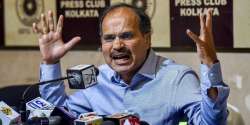Kashmir is like a concentration camp: Congress leader Adhir Ranjan Chowdhury
The Congress leader said that after the government revoked provisions of Article 370 and divided the state into two union territories and Parliament gave its nod to the step, communication links are completely shut and other restrictions put on the people amid a high concentration of security forces.

The leader of the Congress in Lok Sabha, Adhir Ranjan Chowdhury, said on Thursday that Kashmir has become like a "concentration camp" with additional troops deployment and snapped communication links, after the abrogation of provisions of Article 370 of the Constitution which accorded special status to Jammu and Kashmir.
"Prime Minister Narendra Modi had said from the Red Fort earlier that he would solve the Kashmir issue by embracing the people of the state and not by the bullet. But, going by the developments, Kashmir is like a concentration camp in the manner in which everything there has been shut down," he told PTI.
Chowdhury said he had already stated in Lok Sabha that a clampdown had been imposed on Kashmir and the Amarnath Yatra stopped midway.
Internet services have been snapped, shops and businesses are closed and free movement of people has been stopped and locals are not allowed to congregate and are forced to remain indoors, he said. Political leaders have been put under house arrest and no political leader from Delhi is allowed to enter Kashmir, he said on a day former Jammu and Kashmir chief minister Ghulam Nabi Azad was stopped at Srinagar airport and sent back.
The Congress leader said that after the government revoked provisions of Article 370 and divided the state into two union territories and Parliament gave its nod to the step, communication links are completely shut and other restrictions put on the people amid a high concentration of security forces.
ALSO READ | Of embarrassment and major missing: Adhir Ranjan Chowdhury leaves Sonia Gandhi mortified in Lok Sabha
ALSO READ | Can J&K still be an internal matter if monitored by the UN since 1948, asks Adhir Ranjan Chowdhury